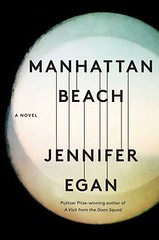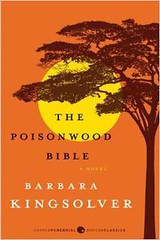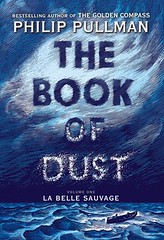This is going to be a short list. Looking back over the books I read in 2018, only three stand out—and by “stand out” I mean books I’d happily read again. Two are new, published this year or in late 2017; one is from 1998 but new to me. Two are mainstream fiction with historical settings, one is young adult science fiction/fantasy.
Speaking of the last, “La Belle Sauvage” by Philip Pullman, upon finishing it earlier this year I re-read Pullman’s earlier “His Dark Materials” trilogy. All three—”The Golden Compass,” “The Subtle Knife,” “The Amber Spyglass“—hold up brilliantly and could easily be added to this list but for the fact I originally read and reviewed them years ago.
Also not listed here are the several Jack Reacher thrillers by Lee Child I polished off in 2018, all the way to the most recent installment, “Past Tense.” Even though I rated some of them highly (there were exceptions), they’re a comfort food addiction, not to be taken seriously. You can read all my past reviews on Goodreads if you’re interested.
 Manhattan Beach
Manhattan Beach
by Jennifer Egan
![]()
Reading “Manhattan Beach,” I couldn’t stop thinking of “A Tree Grows in Brooklyn.” Both novels evoke a past era in New York City. Both feature a strong, engaging female protagonist.
“A Tree Grows in Brooklyn” was an icon of American culture when I was growing up. “Manhattan Beach” may well become one, and should: it is by far the stronger of the two novels. I was fascinated by Francie in “Tree”; I’d follow the Anna of “Manhattan” anywhere she chooses to go. I loved the turn-of-the-20th-Century New York City of “Tree”; I wanted to dive even deeper into the bustling WWII-era City of “Manhattan.” “Tree” is largely a story about growing up and domestic life; “Manhattan,” in the tradition of the Great American Novel, a story about everything: domestic life, growing up, women stepping into non-traditional roles and careers, love, poverty, wealth, crime, war, life and death adventures on and under the sea … and I found it impossible to put down.
Dare I mention Jonathan Franzen and Jennifer Egan in the same sentence? There are similarities there, too. Both are great storytellers, both are very close to some popular novelistic ideal. I loved Egan’s earlier “A Visit from the Goon Squad,” but I did not see a Great American Novelist behind that work. I see one behind “Manhattan Beach.”
I believed in Anna. I know women like her and admire them. Some may think Egan putting Anna in a diving suit is a stretch; I was happy to read in Egan’s afterword that she had in fact modeled some of Anna on women who mastered those daring skills during WWII … and I’ll mention that I myself know several woman fighter pilots, women who once saw military jets flying overhead and said to themselves, “I want to do that too.” Anna’s reactions to the twists and turns of her life … all of which will have you turning pages … are equally decisive.
I mentioned Egan’s research, which shows on every page, though never in an intrusive or showing-off manner. It is what makes everything believable.
Reviews of books I love are the hardest ones to write. I’ll stop here by saying “Manhattan Beach: is a brilliant novel, one you can be assured I’ll push on all my friends.
 The Poisonwood Bible
The Poisonwood Bible
by Barbara Kingsolver
![]()
Synopsis (from Goodreads): “‘The Poisonwood Bible’ is a story told by the wife and four daughters of Nathan Price, a fierce, evangelical Baptist who takes his family and mission to the Belgian Congo in 1959. They carry with them everything they believe they will need from home, but soon find that all of it — from garden seeds to Scripture — is calamitously transformed on African soil. What follows is a suspenseful epic of one family’s tragic undoing and remarkable reconstruction over the course of three decades in postcolonial Africa.”
“If I were to write a nonfiction book about the brief blossoming and destruction of the independence of the Congo, and what the C.I.A. had to do with it, then probably all 85 people who are interested in the subject would read it. Instead I can write a novel that’s ostensibly about family and culture and an exotic locale. And it’s entertaining, I hope.”
— Barbara Kingsolver
This was a book club selection, not one I would have picked up on my own. I had heard of Barbara Kingsolver but had never read any of her stuff. I’ll go right to my reaction: after a short opening chapter in the voice of Orleanna, the mother, each of the Price family’s four daughters began to describe their experiences in the Congo, and I was utterly hooked.
The Price women came alive and I loved them all, even Rachel the Termite, the shallow one. Each has her own distinctive voice and style and way of looking at her family and the world. I didn’t miss hearing from the father at all … one sees quite enough of him through his wife and daughters’ eyes, enough to last a lifetime. I grew up Southern Baptist, thank you, and know the type well. Oh, and by the way, I am the same age as the twins, Leah and Adah, and well remember heavy news coverage of America’s interest in the newly-independent Congo in the early 1960s, including our government’s opposition to the presidency of Patrice Lumumba and the coup that resulted in the Congo’s decades-long nightmare under Mobutu.
It struck me … as I read about Nathan Price’s dogmatic single-mindedness and the physical and psychological punishment he inflicted on his wife and daughters; about the contrast between his empty, irrelevant religion and that of the Congolese villagers; about the Eisenhower/CIA-engineered assassination of Lumumba and the installation of the corrupt dictator Mobutu; even more so about Leah’s later life with Anatole, her black Congolese revolutionary husband … that “The Poisonwood Bible” had surely been the target of book banning attempts in the USA, if not in parts of Africa as well.
A little research uncovered two documented instances: the novel was banned in Port Washington NY schools in 2001; in 2010 it was challenged by New Hampshire parents who objected to its inclusion on a school reading list, citing sexually explicit scenes.
“The Poisonwood Bible” does not appear on the American Library Association’s Top 100 Banned Book list, and the only references to it being banned and challenged I can find online are the secondary ones linked above. Still, given that the ALA itself says most school book bans and challenges go unreported in the media, and are thus invisible to the ALA, I have to believe “The Poisonwood Bible” has been the target of other, unreported, attempts to keep schoolchildren and others from reading it.
When possible, I research and link to contemporaneous local news coverage of book bans and challenges. Why? Because local news reports usually include interviews with those who sought to ban the books in the first place, and that’s where you find out what their real beef was. Unfortunately, I can’t track down contemporaneous coverage for the two incidences listed above.
Sexually explicit scenes? I doubt it. I just finished reading the book cover to cover, and I’m damned if I remember any. No, I’m willing to bet the real objections were to the novel’s less-than-flattering depictions of Christianity and good-hearted American benevolence (specifically the Eisenhower administration’s complicity in overthrowing Lumumba). Most of all, however, I think the parents who got the book banned in New York, and who challenged it in New Hampshire, were uncomfortable with the idea of Leah and Anatole’s mixed-race marriage. Can I prove it? No. Am I right? You know I am.
 La Belle Sauvage (The Book of Dust #1)
La Belle Sauvage (The Book of Dust #1)
by Philip Pullman
![]()
I devoured Philip Pullman’s “His Dark Materials” trilogy several years ago, enrapt from beginning to end. I hadn’t realized, before that experience, how rich young adult fiction could be. Afterward I sought out good YA fiction and science fiction, finding authors and series to love, but all this time what I’ve really been waiting for is more of the world and characters Philip Pullman invented in his original trilogy.
It’s been worth the wait. It all came back, from the first page on: dæmons, alethiometers, Gyptians, Oxford, the witches of the North … and then a reference to Lyra, then Lord Asriel, and then, chillingly, Mrs. Coulter. To my delight I realized “La Belle Sauvage” is a prequel to “The Golden Compass,” with a child protagonist—Malcomb—as fascinating and believable as Lyra Belacqua in the earlier works (Lyra, as mentioned, is here too, this time as an infant, along with her infant dæmon Pantalaimon).
Malcomb is the 11-year-old son of a couple who run an inn just upriver from Oxford. His dæmon is Asta. The adventure starts in the first chapter, when mysterious guests ask Malcolm about the priory across the river and the nuns who live there. It soon becomes known that the nuns have taken in a baby. The baby is Lyra, and sinister forces are determined to snatch her. As in the “Golden Compass” books, the sinister forces are sent forth to do their dirty work by the Magisterium, aka “The Church.” Saving Lyra from the Magisterium’s clutches falls to Malcolm, and good lord it’s a hair-raising tale.
I was literally breathless when I finished the book. How long has it been since I’ve read anything this gripping and engaging? A while, for sure. Oh yes, I read lots of thrillers, and they all have gripping plots, but I always know some bozo like me wrote the book. With Pullman, I forget about the bozo behind the book. When Malcolm’s excited, I’m excited. When he’s frightened nearly out of his wits, so am I. This is how it was when I first discovered my love of reading as a child, when a good book could sweep me off my feet. That Pullman can do that to me as an adult is … well, it’s genius, is what it is.
My understanding is that Philip Pullman actually started working on what became “La Belle Sauvage” before writing the “Golden Compass” trilogy in the early 2000s. He returned to “La Belle Sauvage” two or three years ago, and it’s meant to be the first installment of a new trilogy, “The Book of Dust.” There’s no publication date for the next two books, but in the afterword to “La Belle Sauvage” Pullman says the next one will jump ahead two decades, and feature Lyra in her 20s.
I cannot wait, but I must.
You’ve convinced me about “The Poisonwood Bible,” but left me wishing she *had* written that non-fiction book. I have a couple of books on the Congo on the list, as soon as I finish some of my science reading. So, off to Amazon to buy one more book for the year. Thank you.